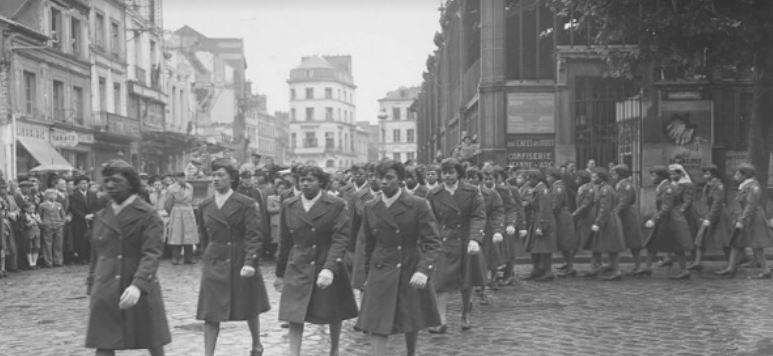[ad_1]
By Col (Ret.) Edna W. Cummings and MSG (Ret.) Elizbeth Helm-Fraizer, US Army
As the nation commemorates the 75th anniversary of WWII’s Allied victory in Europe and navigates the COVID-19 pandemic, we celebrate these Six Triple Eight veterans’ birthdays and a COVID-19 survivor.

May 8, 2020 marked the 75th anniversary of World War II’s Allied victory in Europe. Despite a nation segregated by race and gender, by 1945 approximately 1.2 million African Americans served in the military within the United States, Europe, and the Pacific. More than 6000 African American women also served at home and overseas as nurses and in the Women’s Army Auxiliary Corps (later the Women’s Army Corps). During WWII, the Black press was the primary voice for these brave warriors that enable contemporary media to now share the heroic contributions of African American units such as the Tuskegee Airman, Harlem Hellfighters, Montford Point Marines, and many other people of color who served with distinction. One of these unheralded stories belong to a group of 855 African-American women, known as the 6888th Central Postal Directory Battalion, or “The Six Triple Eight.”
Due to the efforts of First Lady Eleanor Roosevelt and Dr. Mary McCleod Bethune to integrate African-American women into the war effort, in February 1945, the “Six Triple Eight” deployed to Europe as the only all African-American WAC unit sent overseas. Their mission was to clear the approximately two-year backlog of mail for the nearly seven million members of the U.S. military, government personnel, and Red Cross workers serving in the European Theater of Operations. Commanded by then Major Charity Adams, they faced racism, sexism, and worked in austere conditions to clear the mail backlog in Birmingham, England in three months—well ahead of the six-month expectation. By working three shifts daily and processing approximately 65,000 pieces of mail per shift, they processed an estimated 17 million pieces of backlogged mail and packages. After clearing the mail backlog Birmingham, they relocated in Rouen and Paris, France to continue this task. In February 1946, the unit was deactivated at Fort Dix, New Jersey with neither public nor military recognition. Within the past two years the achievements of these unsung trailblazers have been at the forefront of a national historical narrative.

On November 30, 2018 at Fort Leavenworth, KS, five living Six Triple Eight veterans and the family of a deceased 6888th veteran, Vashti Murphy, daughter of AFRO publisher Dr. Carl J. Murphy, attended the unit’s monument dedication https://www.afro.com/afros-murphy-matthews-among-those-honored-for-wwii-service/. In February 2019, the Secretary of the Army awarded the Six Triple Eight the Meritorious Unit Commendation, their only military award for meritorious service. In March 2019, Lincoln Penny Films premiered an award winning documentary about the unit featuring seven living 6888th veterans and AFRO Manager, MAJ (Ret.) Edgar Brookins, http://lincolnpennyfilms.com/index.php/the-six-triple-eight/
As recognition of the Six Triple Eight’s service and contributions to our country, some members of Congress agree that they deserve The Congressional Gold Medal—one of the nation’s highest civilian awards. On February 28, 2019, Senator Jerry Moran (R-Kan) introduced bipartisan legislation, S.633, the Six Triple Eight Congressional Gold Medal Act of 2019 https://www.congress.gov/bill/116th-congress/senate-bill/633. On June 5, 2019, Representative Gwendolynne Moore, (D-WI-4) introduced H.R.3138, the Six Triple Eight Gold Medal House Companion Bill https://www.congress.gov/bill/116th-congress/house-bill/3138
You can help this legislation to pass by contacting Congress https://www.congress.gov/state-legislature-websites and asking them to co-sponsor the Six Triple Eight Congressional Gold Medal Act of 2019. These pioneer patriots should receive this honor –while at least 10 of them are still alive.
We cherish our African American veterans and owe a deep debt of gratitude to the AFRO for its decades of documenting their history. The AFRO’s diligence and archives enabled us to locate the names of Six Triple Eight members who would have otherwise been forgotten.
Related link:
https://www.afro.com/remembering-instrumental-black-women-served-wwii/
[ad_2]
Source link
